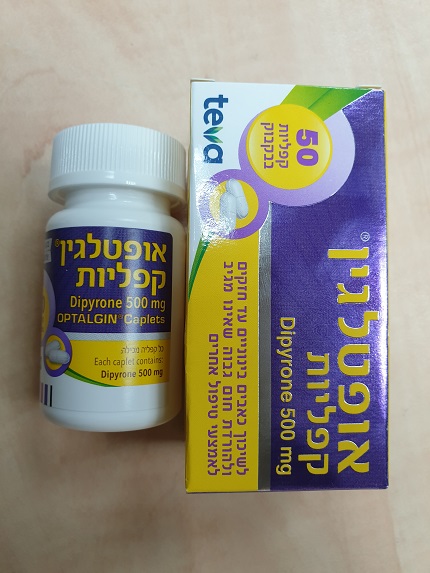Quest for the right Drug

אופטלגין קפליות OPTALGIN CAPLETS (DIPYRONE)
תרופה במרשם
תרופה בסל
נרקוטיקה
ציטוטוקסיקה
צורת מתן:
פומי : PER OS
צורת מינון:
קפליות : CAPLETS
עלון לרופא
מינוניםPosology התוויות
Indications תופעות לוואי
Adverse reactions התוויות נגד
Contraindications אינטראקציות
Interactions מינון יתר
Overdose הריון/הנקה
Pregnancy & Lactation אוכלוסיות מיוחדות
Special populations תכונות פרמקולוגיות
Pharmacological properties מידע רוקחי
Pharmaceutical particulars אזהרת שימוש
Special Warning עלון לרופא
Physicians Leaflet
Adverse reactions : תופעות לוואי
4.8 Undesirable effects The frequency of adverse reactions is defined using the following convention: Very common 1/10 Common 1/100, < 1/10 Uncommon 1/1,000, < 1/100 Rare 1/10,000, < 1/1,000 Very rare ≤ 1/10,000 Not known Frequency cannot be estimated from available data Blood and Lymphatic System Disorders Rare: Leukocytopenia. Very rare: Agranulocytosis (including fatal cases), thrombocytopenia. Not known: Aplastic anemia, pancytopenia (including fatal cases). Optalgin Caplets/Tablets SPC, SZ, 6/2022 NOTIFICATION These reactions can occur even if Dipyrone was previously administered without complications. There are isolated reports suggesting that the risk of agranulocytosis may possibly be increased if Dipyrone is used for longer than a week. This reaction is not dose-dependent and can occur at any time during treatment. It is manifested by high fever, chills, sore throat, dysphagia and inflammation of the mouth, nose, throat and genital or anal area. These signs may be minimal, however, in patients receiving antibiotics. There is little or no swelling of the lymph nodes or spleen. Erythrocyte sedimentation rate is significantly accelerated, whilst granulocytes are considerably reduced or completely absent. Hemoglobin, erythrocyte and platelet values are generally, but not always, normal (see section 4.4). Immediate discontinuation is essential for recovery. Therefore, optalgin treatment must be discontinued immediately, without waiting for the results of laboratory-diagnostic tests, in the event of unexpected deterioration in general condition, persistent or recurrent fever, or painful mucosal changes (especially in the mouth, nose and throat region). Typical signs of thrombocytopenia include an increased bleeding tendency and petechiae on the skin and mucosae. If pancytopenia occurs, treatment must be discontinued immediately and complete blood count must be monitored until it normalizes (see section 4.4). Immune System Disorders Rare: Anaphylactoid or anaphylactic reactions*. Very rare: Analgesic-asthma-syndrome In patients with analgesic-asthma-syndrome, intolerance reactions are typically manifested in the form of asthma attacks. Frequency Not known: Anaphylactic shock*. *These reactions may occur in particular following parenteral application and may be severe and life- threatening, in some cases even fatal. They can also occur if Dipyrone was previously administered without complications. Such reactions may occur during injection or immediately after administration, but may also develop hours later. In the majority of cases, however, they develop within the first hour of administration. Milder reactions are typically manifested in the form of skin and mucosal reactions (e.g., itching, burning sensation, redness, urticaria, swelling), dyspnea and (in rarer cases) gastrointestinal complaints. Such milder reactions may become more severe, progressing to generalized urticaria, severe angioedema (also in the laryngeal region), severe bronchospasm, cardiac arrhythmias, hypotension (sometimes with preceding hypertension) and circulatory shock. Optalgin should therefore be discontinued immediately in the event of skin reactions. Cardiac disorders Frequency not known: Kounis syndrome. Vascular Disorders Uncommon: Hypotensive reactions during or after administration, which are possibly pharmacological in origin and not accompanied by other signs of an anaphylactoid or anaphylactic reaction. Such reactions can lead to severe hypotension. Rapid intravenous injection increases the risk of hypotensive reactions. Optalgin Caplets/Tablets SPC, SZ, 6/2022 NOTIFICATION Dose-dependent critical hypotension may also occur in the event of hyperpyrexia, without further signs of hypersensitivity. Gastrointestinal disorders Not known: Cases of gastrointestinal bleeding have been reported. Hepatobiliary disorders Not known: Drug-induced liver damage including acute hepatitis, jaundice, raised liver enzymes (see section 4.4) Skin and Subcutaneous Tissue Disorders Uncommon: Fixed drug eruption. Rare: Rash (e.g., maculopapular exanthema). Very rare: Stevens-Johnson syndrome or toxic epidermal necrolysis, see section 4.4). Not known: Drug reaction with eosinophilia and systemic symptoms (DRESS, see section 4.4). Renal and urinary disorders Very rare: Acute deterioration of renal function, which may progress in very rare cases to proteinuria, oliguria or anuria, or acute renal failure, acute interstitial nephritis. General disorders and administration site conditions There have been reports of red urine discoloration, which may be attributable to the harmless Dipyrone metabolite, rubazonic acid, present at low concentrations. Reporting of suspected adverse reactions Reporting suspected adverse reactions after authorisation of the medicinal product is important. It allows continued monitoring of the benefit/risk balance of the medicinal product. Any suspected adverse events should be reported to the Ministry of Health according to the National Regulation by using an online form: https://sideeffects.health.gov.il

שימוש לפי פנקס קופ''ח כללית 1994
Moderate to severe pain, antipyretic
תאריך הכללה מקורי בסל
01/01/1995
הגבלות
תרופה שאושרה לשימוש כללי בקופ'ח
מידע נוסף
עלון מידע לרופא
07.08.22 - עלון לרופאעלון מידע לצרכן
21.12.21 - עלון לצרכן אנגלית 07.08.22 - עלון לצרכן עברית 21.12.21 - עלון לצרכן ערבית 12.10.22 - עלון לצרכן אנגלית 12.10.22 - עלון לצרכן עברית 12.10.22 - עלון לצרכן ערבית 14.03.12 - החמרה לעלון 02.10.19 - החמרה לעלון 22.01.20 - החמרה לעלון 22.07.21 - החמרה לעלון 07.08.22 - החמרה לעלוןלתרופה במאגר משרד הבריאות
אופטלגין קפליות